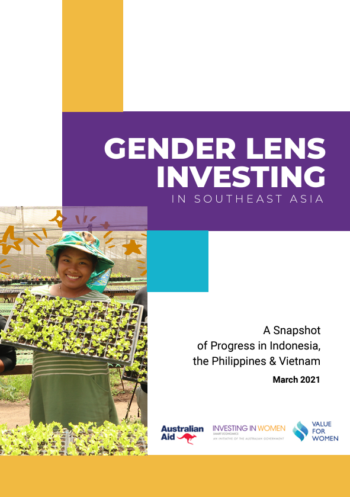Gender lens investing in South East Asia: A snapshot of progress in Indonesia, the Philippines and Vietnam
Summary
This comprehensive report provides an in-depth analysis of gender lens investing (GLI) practices across Southeast Asia. It delves into the current landscape, revealing significant trends and pinpointing both opportunities and challenges faced by investors. It evaluates the economic impact of investing in women-led businesses and the potential for sustainable development through inclusive finance. It also highlights case studies of GLI in action, and details investors’ motivations, challenges faced, and opportunities for scaling up and broadening current practices and investment approaches, underscoring the transformative potential of GLI not only for women’s empowerment but also for regional economic growth. The analysis is grounded in data-driven insights, examining how GLI strategies are being implemented and their effectiveness in promoting gender equality in business leadership and entrepreneurship. Moreover, the report provides inspiration and concrete examples for consideration by impact and mission-driven asset and fund managers, development finance institutions, as well as donors, ecosystem builders, entrepreneurs, and the general public.
This publication is available for download on the VfW website.
Highlights
- Indonesia, the Philippines, and Vietnam account for 80% of GLI deal volume in the region; 85% of these deals came from private impact investors. (Notably, the global pandemic had both positive and negative effects to GLI work, which are discussed in a section of the report.)
- Local and global investors are beginning to apply GLI practices; however, most local impact investors do not identify as gender lens investors even if they apply GLI practices.
- GLI is smart investing. Capital allocation with a gender lens can increase financial returns.
- GLI can positively impact the lives of women and girls, helping to mitigate gender inequalities and to extend access to financing to women entrepreneurs historically excluded from investment. By financing women-led businesses, investors can also address gender inequalities while earning returns.
- GLI is high impact because of the positive spillover effects. These include but are not limited to women being more likely than men to reinvest in their families and communities, and to spend money in ways that benefit their households – on nutrition, education, and health care, for example – leading to improved living standards.
- There is an untapped opportunity for investors to support businesses in becoming more gender-diverse and gender-forward.


